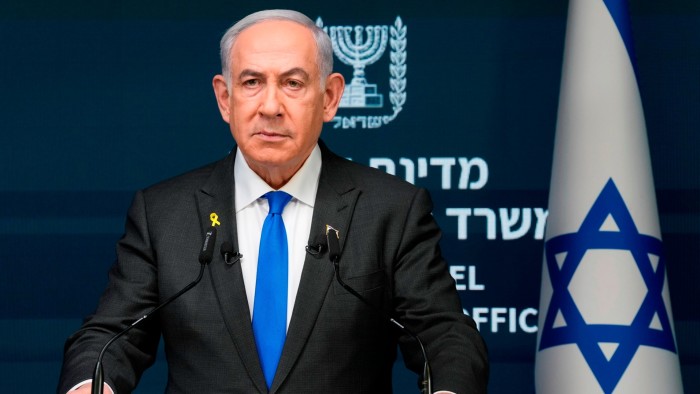Israeli Prime Minister Benjamin Netanyahu on Thursday accused Hamas of rejecting parts of the Gaza ceasefire and hostage release deal, as he faced opposition to the US-brokered deal from his far-right allies.
Israel said it had delayed a cabinet meeting aimed at approving the deal, but Hamas maintained it was committed to the deal announced by mediators on Wednesday.
Two people familiar with the situation said no such cabinet meeting had been scheduled for Thursday evening, although one said it could take place on Friday.
John Kirby, US President Joe Biden’s national security spokesman, said he was confident any “last-minute issues” could be resolved and that the ceasefire would take effect as planned on Sunday, a day before Donald Trump’s inauguration. Trump in the Oval Office.
Israel said earlier Thursday that Hamas was seeking to dictate which Palestinian prisoners should be released in exchange for Israeli hostages.
“Hamas is making new demands that there is no chance Israel will be able to accept, including the list of prisoners to be released,” an Israeli official said.
Netanyahu’s office added that the country would not set a date for a cabinet meeting to approve the deal “until the mediators announce that Hamas has approved all the details of the deal.”
Netanyahu’s government relies on the parliamentary support of two far-right parties that fiercely oppose any deal.
Referring to the Israeli prime minister’s complaint that Hamas was pulling back, Kirby told MSNBC: “Our team on the ground is actually working with him and his team to iron all of this out and flatten it out and get it going.” .
Biden, Trump and the prime minister of Qatar, whose countries have brokered the talks, announced Wednesday night that Hamas and Israel had agreed on a deal that would halt the 15-month war in Gaza and free the 98 hostages still being held captive. .
Trump, the first leader to hail the deal on Wednesday, has been pressing Israel and Hamas to agree to a deal ahead of his inauguration. He has repeatedly warned that there will be “all hell to pay” if the hostages are not released by January 20.
But the far-right Religious Zionist party of Israeli Finance Minister Bezalel Smotrich said Thursday morning it could quit the government if the deal led to a permanent end to the war.
Speaking to Kan Radio, Zvi Sukkot, a lawmaker from the party, said he would “in all likelihood” resign from the government if a deal was approved, as its mission was to “change Israel’s DNA”, not only to create numbers. in the coalition.
The party said later on Thursday that it was “a condition for the party to remain in government and coalition” that Israel resume fighting “immediately after the end of the first phase of the agreement”.
While Smotrich and his far-right ally Itamar Ben-Gvir are not thought to have enough support in the cabinet to torpedo a deal if Netanyahu puts it to a vote, if they both withdraw their far-right parties from the government , this will lose the majority in parliament.
This would not automatically mean the end of Netanyahu’s government, as Israel’s political system does not prohibit minority governments and opposition parties have said they are prepared to support the government if necessary.
But the loss of his two far-right allies would shake Netanyahu’s power and could lead to early elections.
“I don’t think Netanyahu has the power to withdraw from the deal. . . because he was cornered by Trump,” said Aviv Bushinsky, a political analyst and former adviser to Netanyahu. He added that the Israeli prime minister was trying to “square the circle” between Trump and his ultranationalist coalition partners.
If implemented, this week’s ceasefire agreement would offer hope for a pause – and potentially an end – to a brutal war that has become the deadliest chapter in the decades-long history of the Israeli-Palestinian conflict.
The war has left Gaza in ruins, consumed Israeli society and pushed the Middle East to the brink of all-out war.
The agreement includes an initial 42-day ceasefire during which 33 hostages, including children, women, the sick and the elderly, will be released at intervals.
In return, Palestinians would be released from Israeli prisons, aid would be allowed to flow into Gaza, and there would be a partial Israeli withdrawal from the enclave.
By the 16th day of the ceasefire, Israel and Hamas are scheduled to begin negotiations on the second phase of the deal, which would include the release of the remaining hostages alive, a full Israeli withdrawal and an end to the war.
“There are two immediate imperatives, first to fully implement the ceasefire agreement, and then to finalize a plan. . . that provides for the transitional government of Gaza, its security, its reconstruction and that can make the fighting stop,” Antony Blinken, the US secretary of state, said on Thursday.
Trump has argued that the deal is a consequence of his victory in November’s US presidential election, while Biden characterized it as “one of the most difficult negotiations I have ever experienced”.
The deal has also been welcomed by Iran, which has hailed it as a “historic victory” for the Palestinian people and proof that the anti-Israel resistance movement has survived months of devastating war.
The conflict was sparked by a Hamas attack on Israel on October 7, 2023, during which the Palestinian militant group’s fighters killed 1,200 people, according to Israeli officials, and took 250 hostages in the deadliest day for Jews since the Holocaust.
Israel responded with an offensive in Gaza that has killed more than 46,000 people, according to Palestinian officials, and fueled a humanitarian catastrophe in the enclave.
Additional reporting by Neri Zilber in Tel Aviv and Bita Ghaffari in Tehran


